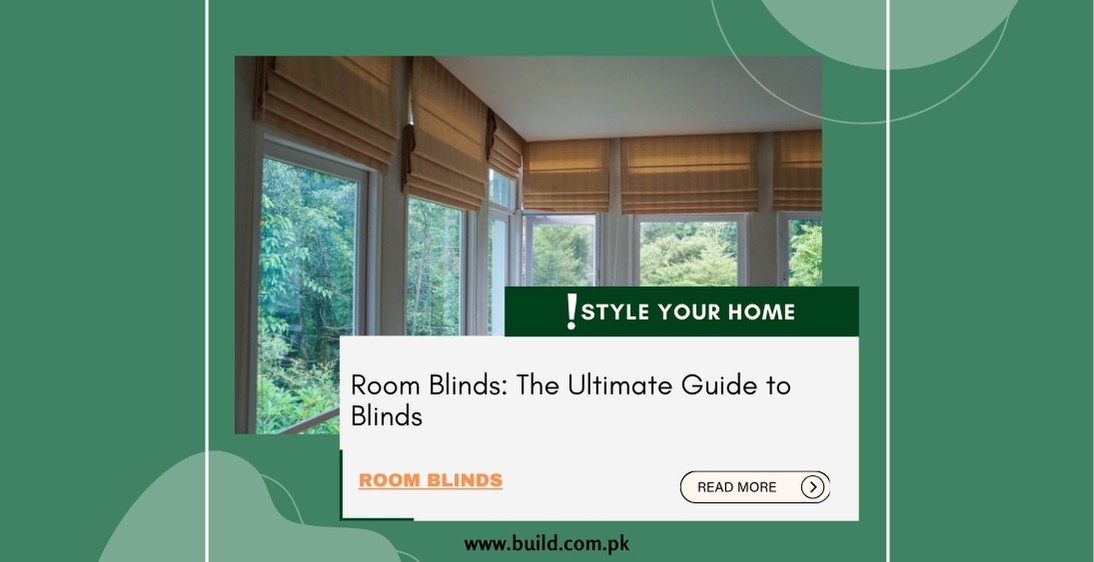Room Blinds: The Ultimate Guide to Blinds

Introduction:
Blinds are a popular choice for window treatments in many homes and offices. They offer a range of benefits, from privacy and light control to energy efficiency and aesthetics. There are various types of blinds available, such as roller blinds vertical blinds, and venetian blinds, which come in different materials, colors, and sizes. In this blog, we will explore the features and benefits of blinds for windows and why they are an excellent choice for your home or business.
Types of Blinds:
Roller Blinds:
Roller blinds are made of a single piece of fabric that rolls up and down, allowing you to control the amount of light that enters your room. They come in different colors, patterns, and textures, and are easy to clean and maintain.

Vertical Blinds:
Vertical blinds are made of long vertical slats that hang from a track. They are ideal for large windows and sliding glass doors and offer excellent light control and privacy.
Venetian Blinds:
Venetian blinds are made of horizontal slats that tilt up and down, allowing you to control the amount of light that enters your room. They come in different materials, such as wood, aluminum, and vinyl and offer a classic and elegant look.
Roman Blinds:
Roman blinds are made of fabric that folds neatly when raised, offering a soft and elegant look. They come in different styles, such as flat, hobbled, or relaxed, and offer excellent light control and privacy.

Features of Blinds for Windows
Light Control:
Blinds allow you to control the amount of light that enters your room. You can adjust them to let in natural light or block out sunlight completely. This feature is especially useful for bedrooms, nurseries, or media rooms, where you need complete darkness to sleep or watch movies.
Privacy:
Blinds offer privacy, preventing outsiders from looking inside your room. You can adjust them to different levels of privacy, depending on your needs. This feature is especially useful for ground-floor windows or rooms facing a busy street.
Energy Efficiency:
Blinds can help reduce energy costs by keeping your room warm in winter and cool in summer. They act as a barrier against heat loss or gain through windows. This feature is especially useful for rooms with large windows or doors, where heat transfer is a concern.
Aesthetics:
Blinds come in various materials, colors, and styles, which can enhance the aesthetics of your room. They can add a touch of elegance, modernity, or simplicity, depending on your preference. This feature is especially useful for rooms with a specific theme or color scheme.
Easy to Maintain:
Blinds are easy to maintain and clean. They do not require special cleaning agents and can be wiped with a damp cloth or vacuumed. This feature is especially useful for busy households or offices where cleaning is a challenge.
Benefits of Blinds for Windows:
Versatility:
Blinds are versatile and can be used in different rooms, such as living rooms, bedrooms, kitchens, and bathrooms. They can be custom-made to fit any window size and shape, making them an excellent choice for unconventional or odd-shaped windows.
Cost-Effective:
Blinds are a cost-effective window treatment option, as they are relatively inexpensive compared to other options such as curtains or shades. They offer excellent value for money and can be easily replaced or updated if needed.
Improved Sleep Quality:
Blinds can help improve your sleep quality by blocking out light and noise, creating a comfortable and peaceful environment. They are especially useful for light sleepers or people with insomnia.
Increased Home Value:
Installing blinds for windows can increase the value of your home. They offer a modern and stylish look that can attract potential buyers or renters. They can also improve the overall aesthetic appeal of your home, making it more attractive and inviting.
UV Protection:
Blinds can protect your furniture, flooring, and artwork from fading or discoloration due to UV rays. They can also protect your skin and eyes from harmful UV radiation. This feature is especially useful for rooms with large windows or doors that receive direct sunlight.
Customizable:
Blinds can be customized to fit your specific needs and preferences. You can choose the type of material, color, and design that best suits your style and functionality. You can also add special features, such as motorization, automation, or remote control, for added convenience and comfort.

Disadvantages of Blinds for Windows
Limited Insulation:
Blinds do not offer as much insulation as curtains or drapes, which can lead to heat loss or gain through windows. This can be a concern in extreme climates or in rooms with large windows.
Maintenance:
Although blinds are easy to maintain and clean, they can accumulate dust and dirt over time, requiring regular cleaning. This can be a challenge for people with allergies or respiratory problems.
Limited Soundproofing:
Blinds do not offer as much soundproofing as curtains or other window treatments, which can be a concern in noisy environments or in rooms that require a quiet atmosphere.
Conclusion:
Blinds for windows offer a range of features and benefits that make them an excellent choice for any home or office. They offer light control, privacy, energy efficiency aesthetics, and ease of maintenance. They are versatile, cost effective, and customizable, and can improve your sleep quality, protect your furniture from UV rays and increase the value of your home. Although they have some disadvantages, such as limited insulation, maintenance and soundproofing they are still a popular and practical option for window treatments. So, whether you are renovating your home or office consider installing blinds for windows to enhance the look and functionality of your space.













